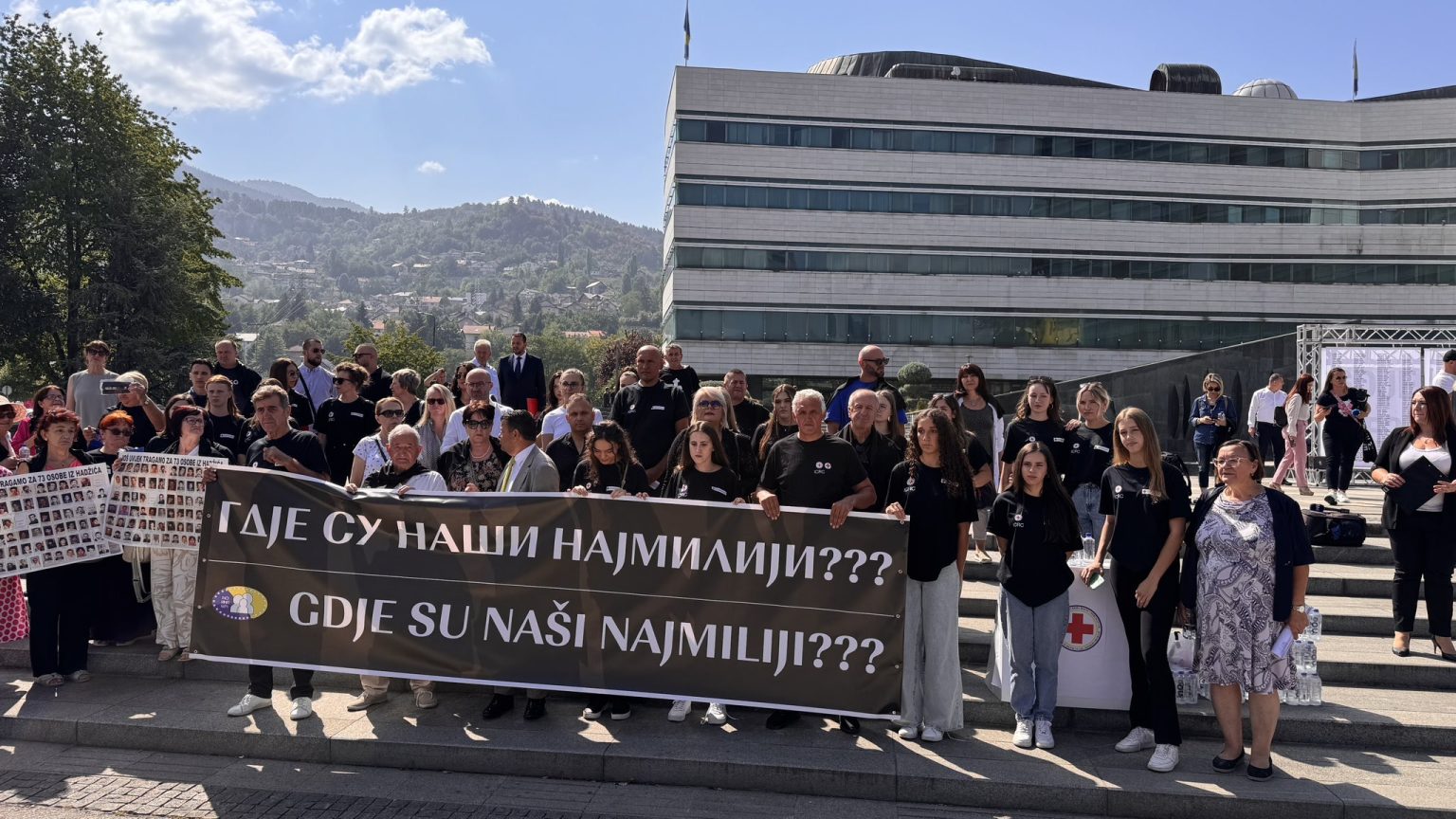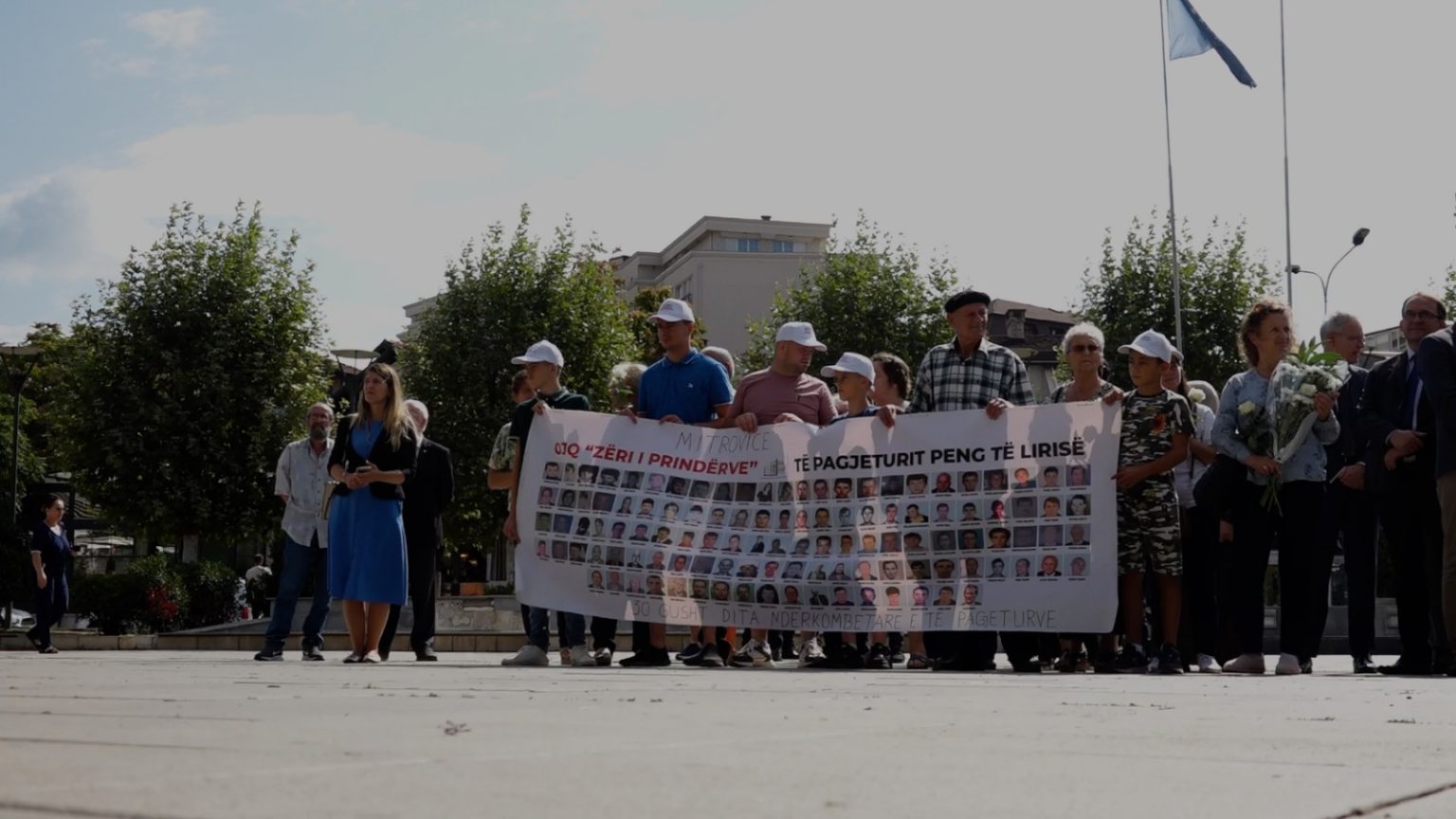Families of the thousands of missing people from the wars in the former Yugoslavia marked the International Day of the Disappeared by laying flowers and displaying the names of people whose bodies have yet to be found.
“We are appealing to those who know, who have information about where the remains of the victims are hidden, to finally speak out, to ease the pain of the families, and to free themselves from the nightmares they are surely living with, carrying such secrets,” Fazlic added.

People in Sarajevo hold a banner saying “Where are our loved ones???” Photo: BIRN.
An exhibition with the names of persons still missing from the country was displayed at the Square of Bosnia and Herzegovina in front of the state parliament and state-level ministries in Sarajevo. According to the Bosnian Missing Persons Institute, the search for 7,616 missing persons is still ongoing, with the most recent mass grave found in the village of Dobro Polje, near Kalinovik.

Missing persons exhibition at the Square of Bosnia and Herzegovina. Photo: BIRN.
In Pristina in Kosovo, Prime Minister Albin Kurti joined families of missing persons to lay flowers at a memorial dedicated to the missing in the city centre. More than 25 years after the end of the Kosovo war, 1,595 people remain missing.
Kurti echoed his request for the wartime archives of the Yugoslav Army’s 37th Brigade to be opened to shed light on the fate of missing persons. Some of its members have been accused of war crimes,

Kosovo Prime Minister Albin Kurti lays flowers during the commemoration in Pristina. Photo: BIRN.
“We are excavating in 13 locations in Kosovo but it will be smoother and easier when this archive will be opened,” Kurti said.
“We call on the international community… to pressure Serbia to open this archive because the truth lies there,” he added.
On Thursday, Kurti also said that preparations began this week for excavations intended to find bodies of wartime victims in Kozle, between Novi Pazar and Tutin in southern Serbia.

A banner with photos of missing persons from Kosovo. Photo: BIRN.
Croatian Minister of War Veterans Tomo Medved attended a forum on missing persons on Friday at the Veterans Centre in Daruvar to mark the International Day of the Disappeared.
“Two days ago in Vukovar, we identified two remains of two people from Vukovar. We are also putting a lot of effort into the extremely demanding location of Petrovacka Dola [waste disposal site near Vukovar] where a few months ago we exhumed at least 10 remains and we expect their identification in the coming weeks,” Medved said in Daruvar.

Croatia’s Minister for War Veterans laid a wreaths for the International Day of the Disappeared. Photo: VladaRH/X.
“During our mandate, we resolved 268 [missing persons’] fates, and families were given the opportunity to bury their loved ones and light a candle,” he added.
“We have acquired state-of-the-art laboratory equipment, and we are making great efforts to coordinate the State Attorney’s Office, the security-intelligence community and all components of the government,, but cooperation with families is extremely important in order to be as quick and efficient as possible,” Medved continued.
Croatia is still searching for 1,792 persons who disappeared and are believed to have died in the country’s 1991-95 war.

Tomo Medved, the Croatian Minister for War Veterans, addresses a gathering in Daruvar. Photo: VladaRH/X.
The International Commission on Missing Persons, ICMP, says that during the conflicts in former Yugoslavia, more than 40,000 persons disappeared and were missing. About 70 per cent of these have since been found but 30 per cent are still being searched for.
The ICMP database, which includes missing persons in Bosnia and Herzegovina, Croatia, Kosovo, Montenegro and Serbia, currently has 11,322 unresolved cases registered.





